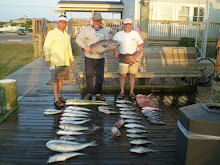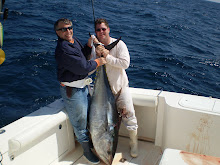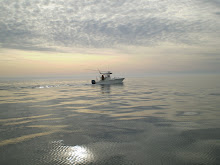
By Jim Field
We currently are living in a window--measured in the span of a few years--when the fate of the Atlantic bluefin tuna will be decided for all time. In the last year, I have started to read articles about this catastrophe in the newspapers, learning just enough to know that man is fiddling while Rome burns. Starting today, I will post everything on this topic that I come across. Most of the information is fascinating--details about the fish and their populations that you would think sportfishermen would want to know. It is also fascinating in a macabre way--like watching a car crash: you don't want to see it happen but you can't turn away. Through ignorance, greed, manipulation, the effects of poverty, and the apathy of government officials worldwide, the bluefin tuna have been decimated around the globe, numbers plummeting in the last decade in particular.
In the text below, I've reproduced a news release from the U.S. government on its position relative to international efforts to protect bluefin tuna. Forget the bureauctratic details and maneuvering, look for the facts about the fish themselves, the good and bad guys, the state of the fishery, and the probable implications for all of us.
Here's a primer to help make sense of it all:
- There are two international bodies holding the fate of the tuna
(1) CITIES--don't know much about this group
(2) ICCAT--a weak entity constantly caving in to interests--especially European interests
- There are two populations of tuna being managed (that's a leap of faith) separately:
(1) the Eastern Atlantic and Mediterranean
(2) the Western Atlantic
- There are good guys: Western stock fishermen (our guys keeping to the quotas)
- There are bad guys: Eastern stock fishermen (the no good cheating Europeans)
Okay, here's the announcement from Tom Strickland, an Assistant Secretary of the Interior over Fish, Wildlife and Parks:
Part I: the Bureaucratic Setup:

Strickland Announces Continued United States Support for International Proposal to Protect Bluefin Tuna
WASHINGTON, D.C. – The United States will continue its support for a proposal to ban all international commercial trade of Atlantic bluefin tuna at this month’s meeting of the Convention on International Trade in Endangered Species of Wildlife Fauna and Flora (CITES) in Doha, Qatar, Assistant Secretary of the Interior for Fish and Wildlife and Parks Tom Strickland announced today.
Strickland, who will head the U.S. delegation to the 15th Conference of Parties (CoP15) of the 175-nation treaty, initially announced support for the proposal last October, but left open the possibility that the United States could modify its position if the International Commission for the Conservation of Atlantic Tunas (ICCAT) adopted significantly strengthened management and compliance measures during its November 2009 meeting. “Under the leadership of NOAA, the United States entered the meeting seeking the strongest possible agreement for the conservation of eastern Atlantic and Mediterranean bluefin tuna. We recognize that the parties to ICCAT took some unprecedented steps,” said Strickland. “However, in light of the serious compliance problems that have plagued the eastern Atlantic and Mediterranean fishery and the fact that the 2010 quota level adopted by ICCAT is not as low as we believe is needed, the United States continues to have serious concerns about the long-term viability of either the fish or the fishery.”
Part II: The Decimated Stocks
 The Atlantic bluefin tuna is highly prized, especially for sashimi, and a single fish can be sold for tens of thousands of dollars. (Photo at left of Japanese fish market.) The Eastern Atlantic and Mediterranean stock is threatened by overharvesting, which includes illegal, unregulated, and unreported fishing. In the Atlantic Ocean, bluefin tuna are managed as two separate stocks, an Eastern Atlantic and Mediterranean, and a Western. The Eastern Atlantic and Mediterranean stock of the Atlantic bluefin tuna has declined steeply during the last 10 years. Based on estimated catches, scientists estimated the spawning stock biomass in 2007 to be 78,724 metric tons. This contrasts with the biomass peak of 1955, at 305,136 metric tons. The decline over the 50-year historical period ranging from 1955 to 2007 is estimated at 74.2 percent, the bulk of which (60.9 percent) took place during the last 10 years.
The Atlantic bluefin tuna is highly prized, especially for sashimi, and a single fish can be sold for tens of thousands of dollars. (Photo at left of Japanese fish market.) The Eastern Atlantic and Mediterranean stock is threatened by overharvesting, which includes illegal, unregulated, and unreported fishing. In the Atlantic Ocean, bluefin tuna are managed as two separate stocks, an Eastern Atlantic and Mediterranean, and a Western. The Eastern Atlantic and Mediterranean stock of the Atlantic bluefin tuna has declined steeply during the last 10 years. Based on estimated catches, scientists estimated the spawning stock biomass in 2007 to be 78,724 metric tons. This contrasts with the biomass peak of 1955, at 305,136 metric tons. The decline over the 50-year historical period ranging from 1955 to 2007 is estimated at 74.2 percent, the bulk of which (60.9 percent) took place during the last 10 years.The Western Atlantic spawning stock has declined by 82.4 percent from 49,482 metric tons in 1970 to 8,693 metric tons in 2007. During the past decade, the Western stock has stabilized at a very low population level. Many experts correlate this stabilization to adoption of rigorous science-based catch quotas and other management measures together with effective monitoring and enforcement. Such measures ensured strict compliance with ICCAT’s ruled by the U.S. fleet.
Strickland noted that the parties to ICCAT took positive steps at the November meeting. These steps included a commitment to set future catch levels in line with scientific advice, to shorten the fishing season, reduce fishing capacity, and close the fishery if the stocks continue to decline. However, in light of the serious compliance problems that have plagued the eastern Atlantic and Mediterranean fishery and the fact that the 2010 quota level adopted by ICCAT is not as low as needed, the United States will support the proposal to list Atlantic bluefin tuna in Appendix I at CoP15 [meaning a ban on all commercial trade]. If the bluefin tuna is listed under Appendix I, commercial fishermen in the United States could continue to sell western Atlantic bluefin tuna caught in the U.S. Exclusive Economic Zone (EEZ)domestically. Fishing in the EEZ is tightly regulated in the United States to ensure that it meets the ICCAT science-based quota. The United States is both a consumer and a net importer of Atlantic bluefin tuna. Strickland indicated that the United States will explore measures to assist fishermen if international trade is restricted.
“We understand the frustration of our U.S. fishermen who have followed the scientific recommendations and regulatory provisions of ICCAT for many years while their counterparts in the eastern Atlantic and Mediterranean have often overfished and engaged in ineffective management,” Strickland said. “The U.S. government is committed to working with our many international partners to continue to rebuild Atlantic bluefin tuna and ensure sustained conservation and management of the species into the future.”
When you read this, you have to wonder: what chance do the fish really have?









No comments:
Post a Comment